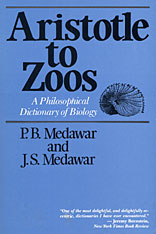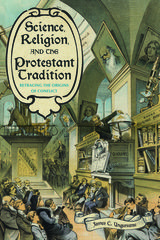
In the spirit of Voltaire—and occasionally in the spirit of P. G. Wodehouse—P. B. and J. S. Medawar have crafted for the life sciences a source of reference that is meant for browsing, a book both authoritative and filled with delights. The authors’ breadth of knowledge is encyclopedic— arranged, appropriately enough, from A to Z—but more than that, they illuminate the ideas of biology with wit and intelligence and uncommon good sense. They bridge the chasm in our culture between the technically and the humanistically trained, breaking the code of jargon that limits access to scientific understanding. The Medawars’ special gift is to offer, at the same time, a pleasurable introduction for the layman and a source of new insight for the specialist.
In this book we can find a clear and meaningful definition of interferon, a useful explanation of the immune system, and thoughtful essays on sociobiology, eugenics, and aging. But we also find: “It is a popular fallacy that chewing gum regains its flavor if removed from the mouth and parked, say, under a chair.”
Whether in a serious discussion of cancer or a whimsical reflection on “chicken and egg” imagery in science, the Medawars’ blend of fact, literary allusion, historical anecdote, mythical and folk tradition, and even professional gossip is a rewarding exercise in biology as a humanistic endeavor.

The German Romantic theologian and philosopher Schleiermacher wrote, "The virtuosity (or special calling) of a person is at the same time the melody of that person's life, and it remains a simple, meager series of notes unless religion, with its endlessly rich variety, accompanies it with all notes and raises the simple song to a full-voiced, glorious harmony." It is around this melody that Jaroslav Pelikan, a great theologian of our own day, weaves the polyphonic threads of philosophy, theology, morals, history, and personality to create a singular portrait of his life and work.
The Melody of Theology is really two books in one: a dictionary in which a reader can browse through piquant explorations of some of the most interesting topics in Christian theology, and an intellectual autobiography in which Jaroslav Pelikan has used those topics to give an account of the traditions to which he owes the formation of his own mind and spirit. As he says, "An intellectual autobiography in the format of a 'philosophical dictionary' permits the self-indulgence of employing the seeming objectivity of some eighty-two entries, arranged in the impersonal sequence of alphabetical order, to express a completely personal set of prejudices."
Among the large topics addressed in this volume are the Bible, Faith, Grace, Reformation and Renaissance, and Sin. Among the towering figures of religion and theology are Dante, Ralph Waldo Emerson, Erasmus, Gibbon, Martin Luther, Paul the Apostle, and Schleiermacher. Among the technical topics analyzed are Apocatastasis, Christian Creeds, the term "Ecumenical," Eschatology, Patristics, and the Trinity. The Melody of Theology belongs on the bookshelf of anyone who wants to study a history and tradition that precede us and will continue after us, and also of the reader who would like to make the acquaintance of a subtle analytic mind and a generous open heart.

A great moralist and social thinker illuminates the most vexing issues of our time—war, old age, racism, abortion, boredom, crime and punishment, sociobiology, and seventy odd others—in a dazzling book that is by turns hilarious and somber but always vigorous and stimulating. Upon each subject Robert Nisbet offers piercing and often unexpected insights.
Joining the colorful company of Montaigne, Voltaire, Burke, and Mencken, Nisbet writes for his own age and with his own prejudices. He ranges from the historical to the contemporary, from great men to lesser ones, from pieties and wisdoms to fads and effronteries. The work, in other words, is neither philosophy nor a dictionary (except that the subject matter is arranged in alphabetical order), but the distillation of Nisbet’s wisdom, learning, and profound moral conviction. He argues for liberty over equality, for authority against permissiveness, for religion but also for science, for the individual and his rights but against individualism and entitlements. The center of his thinking is the fervent wish for a community linked by history, religion, and ritual, in which children are raised by families rather than by the state, but in which blind custom and belief are questioned and creativity emerges. Determinism of any kind he finds untrue to human nature and history. Man is free to improve himself or destroy himself.
READERS
Browse our collection.
PUBLISHERS
See BiblioVault's publisher services.
STUDENT SERVICES
Files for college accessibility offices.
UChicago Accessibility Resources
home | accessibility | search | about | contact us
BiblioVault ® 2001 - 2024
The University of Chicago Press









